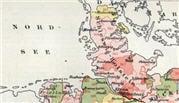Source Information

About Saarland, Germany, Births, Marriages, and Deaths, 1776-1875
About this collection
This collection contains birth, marriage and death records from more than 80 communities now found, for the most part, in the modern German state of Saarland which was created in 1957. The records span the years from 1776 up to and including 1875. Historically, the territories comprised by modern Saarland alternated constantly between German and French rule. The records reflect the eventful history of the region. This collection includes records from the communities of Homburg, Merzig, Wadern and others, but not for Saarbrücken.
As early as September 20th 1792, the French National Assembly had passed a law governing the documentation of civil status in France. That ruling encompassed some of the communities included in this collection. The French model for recording Births, Marriages and Deaths was officially introduced when French troops began the occupation of the left bank of the Rhine on May 1st, 1798 and established four new departments (Rhin et Moselle, Roer, Sarre, and Mont-Tonnerre). Throughout the entire former German Empire, civil registration was taken over and performed by local registry offices beginning in January 1, 1876.
The collected records are arranged chronologically and usually in bound yearbook form which are collectively referred to as "civil registers." Occasionally, alphabetical directories of names were also created. While churches continued to keep traditional records, the State also mandated that the personal or marital status of the entire population be recorded.
What you can find in the records
Civil registrars recorded births, marriages and deaths initially in French and without preprinted forms. After 1815, the forms were often preprinted and filled out in German. In each record the birth date and the death date usually differ from the date they were registered. Depending on the individual form or on the formulations used by the registrar, you may find:
For Births:
- Sequential or Certificate Number
- Registration Date
- Informant: Given Names, Last Name, Age, Occupation, Residence
- Mother: Given Names, Last Name, Maiden Name, Age, Residence
- Child: Birth Date, Time of Birth, Sex, Given Names
- Signatures
For Marriages:
- Sequential or Certificate Number
- Marriage Date
- Groom: Given names, Last Name, Occupation, Residence, Birthdate and Birthplace, details about his Parents
- Bride: Given names, Last Name, Maiden Name, Occupation, Residence, Birthdate and Birthplace, details about her Parents
- References to, among others, birth records and marriage banns
For Deaths:
- Sequential or Certificate Number
- Registration Date
- Informant: Given Names, Last Name, Occupation
- Deceased: Given Names, Last Name, Maiden Name, Occupation, Age, Residence, Birthplace, Spouse/Parents, Place/Date of Death, Time of Death
- Signatures
More about using this collection
Depending on the year and type of register, pages may contain multiple entries (written one after the other). An entry may start on one page and continue on to the next.
Civil Registry records may have had additional events from the life of the person recorded later on in the margins. These notes, sometimes referred to as "narration," can contain very useful information but they have not been indexed. As a result, information from the notes will not found via the search form.
The French Republican Calendar was used in the registers (until December 31, 1805).
Under "Browse this collection,” select the Civil Registration Office and Year Range of the register desired. The time periods covered vary, and the collection may not contain birth, marriage and death records for every location.
 Need help with the German language? Find resources in our German Research Center.
Need help with the German language? Find resources in our German Research Center.